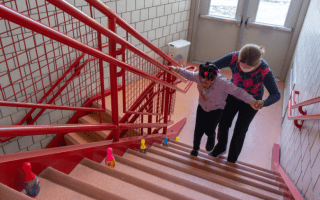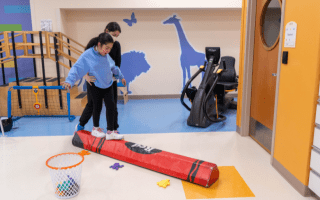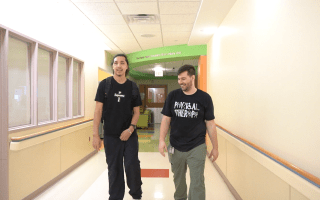With Feeding Tube and Innovative Parent Education Program, AJ Thrives
For More than 60 Medically Fragile Infants and Children at Blythedale, Feeding Tubes Provide Essential, Life-Saving Nutrition
Eight-month-old AJ was born with both Down syndrome and Tetralogy of Fallot, a rare condition caused by a combination of four heart defects. Shortly after his birth, AJ required major surgery to improve blood flow to his heart. His complex condition necessitated both a tracheostomy (a surgically placed passageway to accommodate a breathing tube) and gastrostomy tube, or G-tube, to provide direct access for feeding.
Like AJ, many children with complex medical needs require a tracheostomy because they were born with airways that aren't fully developed. These infants and children are admitted to Blythedale with specialized medical equipment, including ventilators, that can make feeding by mouth or bottle difficult or impossible. For these children, tube feeding is a lifeline to improved health and nutrition.
“With his tracheostomy, it would be difficult to have a nasal-gastronomy tube (NG) tube so being able to have the G-tube that allows food to go right to his stomach has been a blessing," said his mom, Christi.
Since his admission to Blythedale in December for ventilator weaning and post acute neonatal care, AJ has been making steady gains with increased food intake and decreasing reliance on the ventilator. While he continues to grow and thrive, his parents are learning how to care for their medically complex child in order to bring him home.
Parent and caregiver training is an essential service provided to all parents with medically complex children at Blythedale. The Hospital’s Nursing staff works closely with the Clinical Nutrition team, speech therapists and other clinicians to provide training and education. Child and Family Education Coordinator Angela Larkin, MSN, RN, says the training is curriculum-based as most parents “don't just have one thing to learn but multiple things so that they're prepared to be successful at home.”
Though many babies and children will transition to feeding by mouth while they are at Blythedale, many others will still require tube feeding after they are discharged home.
“The majority of children with complex medical needs, require a feeding-tube device," said Larkin. "There are multiple different versions of that, whether it's inserted through the nose or is surgically placed through their stomach, or, if necessary, it can go into their intestines. We individualize our training to match every patient's specific needs."
"We help our parents become comfortable so that its natural to be around the trach and everyone knows how to use the device safely so that they can be managed at home in a nurturing environment,” said Larkin.
Christi reflected on her son’s journey. "I'm so grateful to have a feeding tube during all of this,” she said. “It's amazing to think about what could be if we didn't have [feeding tubes] as an option."
According to Larkin, the objective of the Parent and Family Education program at Blythedale is to help the families become the educators. "Our goal is for our caregivers to leave Blythedale, knowing how to care for their child so well that they can teach others at home and build their community of support."
"The parent training that I've received at Blythedale has been amazing,” confirmed Christi. “It's been readily available and any time that I need support or feedback, they're there. They allow me to do what I need to do to be really hands-on with AJ. I need that, and he needs that. It's been a really pleasant experience."



